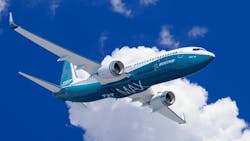Boeing Co. is developing a broad agreement with the State Corporation Russian Technologies (Rostech) to expand its titanium sourcing agreement with VSMPO-AVISMA Corp. and to supply its 35 of its new 737 MAX commercial airliners, a deal worth an estimated $3.5 billion. The aircraft OEM indicated it expects to invest $27 billion in Russia over the next 30 years, for raw materials and components, engineering services, and other projects.
Rostech is a majority shareholder in VSMPO-AVISMA Corp., a Russian titanium producer that supplies aircraft components to Boeing; and in Aviation Capital Services LLC, a jet leasing company. Ray Conner, Boeing Commercial Airplanes president and CEO, and Sergey Chemezov, chairman of VSMPO-AVISMA and CEO of Rostech, pledged to work together to grow the relationship between the two companies.
"Rostech has been a reliable and valuable partner to Boeing in Russia for many years, and together we achieve results that allow us to grow our businesses," Connor stated.
VSMPO-AVISMA is the world’s largest titanium producer and has been supplying raw material and titanium parts to Boeing since 1997, through a series of long-term purchasing agreements. It has similar arrangements in place with Boeing rival Airbus SAS.
In one aspect of the discussions, Boeing and VSMPO-AVISMA are considering expanding their current titanium-producing venture, Ural Boeing Manufacturing (UBM), to support production increases for Boeing’s Next-Generation 737.
UBM is a 50/50 partnership in Verkhnyaya Salda, Russia, that machines titanium forgings. Currently, it is installing four machining centers for landing gears produced from titanium beams. Those machines will be in service in 2013.
Also, Boeing and VSMPO-AVISMA aim to continue backing their joint venture Titanium Innovation Center: it has already developed three new technologies used to produce the 787 Dreamliner and Next-Generation 737 jets, and may be used by other Russian aerospace manufacturers, too. These include a new high-strength titanium alloy and a fabrication technology for titanium sheets for super-plastic titanium forming.
Boeing said the two companies would continue developing technologies and alloys to reduce the cost of titanium parts in commercial airplane manufacturing.
Component management
In the second frame of negotiations, commercial aviation services, Boeing and Rostech are seeking to co-develop a component management service to support Russian airline customers. Such a venture might reduce investment costs, simplify logistics, and reduce delivery time for critical parts to Russian airlines.
They also are studying ways for Boeing to assist Rostech to develop repair and overhaul capability for Western aircraft components in Russia, in order to grow that country’s domestic aviation parts repair and overhaul sector. “Going forward, this expertise can support Rostech's ability to build an efficient and reliable support infrastructure for Russian-made jets, such as the Sukhoi Superjet 100,” according to their statement.
The third aspect of the discussions involves Boeing and Aviation Capital Services LLC, a Rostech. Rostech committed to purchase 35 737 MAX airplanes, and though Boeing indicated the deal is valued at over $3 billion according to current list prices, the details of the purchase are still under review.
The 737 MAX will be the fourth generation of Boeing’s single-aisle passenger jet. It will debut in 2017, and will offer long-distance range and lower fuel-burn ratings than current models or its intended alternatives.
"Cooperation with Boeing allows us to offer new technological solutions for the global market. Today VSMPO-AVISMA is one of the largest titanium suppliers to Boeing and its key partner in the field of new alloy development," Chemezov said. "In recent years, the partners have developed three new technologies in a joint innovation center. Extending cooperation with Boeing will help us create even better and more competitive solutions for the global aviation industry."
About the Author
Robert Brooks
Content Director
Robert Brooks has been a business-to-business reporter, writer, editor, and columnist for more than 20 years, specializing in the primary metal and basic manufacturing industries.
